Paul Jay is the guest on The Barricade discussing the poisonous witches brew of the U.S. military-industrial complex and Christian nationalism, which are pushing conflict with China and long-term war in Ukraine.
Maria Cernat
Hello. Hello, friends, and welcome to our show. This is a show that The Barricade produces with theAnalysis.news. I am your host, Maria Cernat. I am an academic based in Bucharest. With me is the co-host of the show Boyan Stanislavski, a Bulgarian-born Polish journalist. Thank you for being here with us, Boyan.
Boyan Stanislavski
Hello. Great to be here.
Maria Cernat
Of course, Paul Jay, journalist and filmmaker. He’s the founder and host of theAnalysis.news. His films have won numerous awards at major festivals around the world. He was also chair of the Documentary Organization of Canada. He provides very interesting commentary/analysis on political situations. Thank you for being here with us, both.
Paul Jay
Thank you, Maria and Boyan.
Maria Cernat
So let’s dive straight in. In the first part of the show, we are going to discuss how you, Paul, see things from Canada, where you’re currently based. If this, like in Ukraine, is something that you’ve experienced since you have a lot of experience. You lived through the Cold War. You lived through 9/11, and you can tell us a lot about what is happening now. The first question that I want to ask is a rather general one. I was discussing this with a lot of friends, with Boyan, and I’ve been watching a lot of documentaries/discussions, especially discourses put forward by economists like Richard Wolff. He is warning people about the failing U.S. economy and the inevitable change in its hegemonic position. Would you agree with him that things are about to change from a unipolar to a multipolar world due to the current situation and other developments related to the economy?
Paul Jay
Well, first of all, I think it’s important that I point out that I am an authority on nothing. Over the years, as you pointed out, I’ve lived a long time, which, in itself, does not necessarily lend credibility. What I have been able to do is talk to a lot of smart people, and I remember much of it. I mean that in all seriousness. If I have any expertise, it’s as a filmmaker. I think I asked good questions, but I have not had the time, preoccupation or training to have real expertise in the kind of subjects I’m about to talk about. So I remain with an open mind on everything I’m about to say. I think, in fact, [Friedrich] Engels said something very interesting near the end of his life. He said that we thought there would be revolutions across Europe much sooner than they were, and in fact, there really weren’t during his lifetime. He said we were always playing catch up on the data. If you’re really going to do analysis: political analysis, geopolitical analysis; it should really be based on, first and foremost, economic data and other actual data. In those days, they didn’t have the speed of data that we have now. So he said it was hard for our analysis to keep up with current events.
In some ways, we almost have the opposite problem now. There’s almost too much. There’s a sea of data, contradictory data, and a sea of experts who contradict each other. So to talk about the demise of American-dominated global capitalism, one really needs a handle on the data. I don’t have it, and I don’t know exactly who does. As I say, there are such contradictory approaches to, in theory, the same data. So what do we know? We know that global capitalism is managed by the United States. The Fed plays an extremely important role in dealing with periodic crises and sometimes big, enormous crises like 07/08. The Fed not only propped up American banks, which propped up European banks, who loaned money to major corporations. The global capitalist system is very dependent on the role of the United States as the largest economy and the reserve currency to manage what is essentially chaos. The system is extremely chaotic. Every so often, this chaos hits a breaking point in terms of the financial institutions, and the Fed rushes in to save it.
Now, the Chinese are dependent on that, as is every other country. That’s part of the global capitalist system, and China is. Now China may have some real socialist characteristics. You can debate whether it’s socialist or not socialist, but you cannot debate that its economy is now fundamentally integrated into global capitalism. Up until now, as I said, global capitalism depends on the strength and power of the United States to keep it within some kind of organized and functioning system. And because the United States plunders the world, because of its dominant position in global capitalism, and because it’s a large developed market, it has the resources to do this, and it can make up trillions of dollars of money. It’s not just made-up money. Brookings Institute did a study of the actual dollar figure of assets in American hands. These are actual assets after all liabilities in private hands. My memory is that it was something like $95 trillion. Now, the whole GDP of the United States is 18 or 19 trillion and China’s approaching the same number. So $95 trillion is a lot of money. So when the Americans, quote-unquote, make up money, it’s not like they don’t have, in theory, assets behind all that made up money. You take a very poor country that can’t make up a lot of money because not only is it not the reserve currency, but in terms of resources and market, it doesn’t actually have the wealth. Well, the United States does.
The other thing, China needs the American market, at least until now, and I would think in the near future, every bit as much as the Americans need the Chinese market. The Russian invasion of Ukraine and now the kicking out of Russia from the Western banking system, I don’t see how that changes the fundamental mutual dependency of Chinese and American economies. So right now, I do not see some great demise of American capitalism. The Republicans look like they’re going to take Congress in 2022. If they took the presidency in 2024, it could introduce even more chaos to the American political system, which is practically dysfunctional now. It should be understood that dysfunction works in the interest of the American oligarchy, the American elites. They like when Congress is paralyzed. On the whole, they don’t want anything passed in terms of increased taxation or regulation. Paralysis in Congress is good for them. A Republican President who’s not completely a maniac, and [Donald] Trump in their eyes, became one. The evidence of that is January 6, when the attack on Capitol Hill was taking place.
The Association of American Manufacturers, which is the largest corporate lobbying organization in D.C., an hour after the doors of Capitol Hill were breached, issued a press release calling for Vice President [Mike] Pence to invoke the 25th Amendment. This allowed the Vice President, the majority of the Cabinet and some other senior people to remove Trump. They called for him to remove Trump because they thought not having a peaceful transition of power was mad. They’d already gotten what they wanted out of Trump. Anyway, the point is the American political system is increasingly dysfunctional, but that doesn’t mean, as an economic gorilla, it’s so dysfunctional.
So do I think we’re witnessing the demise of American-led, dominated global capitalism? Eventually, sure. What’s that Mark Twain quote? The reports of my death have been greatly exaggerated. People have been predicting this every single year for as long as I can remember; the demise of American-led global capitalism. The point is, what’s the alternative? Eventually, maybe China will emerge, and there will be another center of capitalism, Chinese style, but it isn’t Russia that is going to be the determining factor for when that happens. I’m sorry for the long-winded answer, but no. What’s the alternative for China right now? There really isn’t one. So unless we’re talking very long term, I don’t see any short-term demise.
Maria Cernat
Yes, but what is the alternative in general? Let’s say that we witness the transition from this unipolar world where the U.S. holds all the cards to a multipolar world.
Paul Jay
I’m sorry. Okay, hang on. Maybe I didn’t really answer your question. I don’t think we’re in a unipolar world anymore. The single superpower world is over with. The strength of China, certainly, and we will see where Russia ends up in all this, but certainly Russia had an independent, for better or worse. I’m not so sure it was for the better. At any rate, Russia had an independent ability to use its military in a way that other countries under the U.S. umbrella do not. So, no, I don’t think we’re already not in a single superpower world, but that’s not the same as the demise of American-led global capitalism. Those are two different issues.
Maria Cernat
Yes, I think the distinction is important, and it somehow anticipated my next question. Let us assume, as you said, that China takes over. Are we really so naive to think that things are going to suddenly change for the better just because you have another boss, another leader? In my understanding, neither China, Russia, nor another superpower, they don’t want to change the system fundamentally. They just want to have a seat at the table or to be the leaders. They don’t want to fundamentally change the system.
Paul Jay
Yeah. Well, I don’t imagine in any foreseeable future, China, quote-unquote, takes over. I see China becoming increasingly an equal power. On the other hand, it does not have a global military footprint almost at all. I don’t see that they plan to. I also think that having a global military footprint is highly overrated. What exactly has it done for the United States to have this fantastic global military reach? In every major war that the United States has been in, they’ve essentially lost. They fought to a stalemate in Korea. They lost in Vietnam. They essentially lost in Iraq. I’m probably missing a bunch.
Boyan Stanislavski
Afghanistan.
Paul Jay
They lost in Afghanistan. They had a glorious victory in Grenada. They were able to invade Panama and kidnapped Marcos [Manuel Noriega]. If I’m remembering his name correctly.
Maria Cernat
Manuel Noriega, I think that was his name in Panama.
Paul Jay
To a large extent, this massive military might has been a boondoggle of money-making for the military-industrial complex. What’s been effective in terms of asserting U.S. power has been financial blackmail and funding opposition, which essentially means the activity of the CIA [Central Intelligence Agency]. The CIA, on the whole, has had some real victories and has been quite effective.
There’s a book called Spoils of War by Andrew Cockburn. He makes the argument that, to a large extent, in these wars, the object was money-making. It never was winning. Many of the weapon systems that have been built as part of this military-industrial complex don’t even work. They’re about money-making. That said, the Americans do have the ability to throw tons of the most advanced arms into Ukraine and other places. So it’s not like it’s nothing. China is not vying for that. On the other hand, China is already the major training partner of most of the countries in Latin America. They’ve already supplanted the U.S. in many ways without any military projection at all. So we’ll see where this all ends up.
All I can say is that it’s extremely dangerous. A multipolar world, in some respects, will be good if it balances U.S. power in certain places. In other respects, it could get very dangerous if one of these rising powers decides to extend its power even more. Of course, with China, the thing is— there’s this famous quote from [Vladimir] Putin. He’s asked if there was a nuclear attack on Russia, and you were faced with the choice of a counterattack, knowing it would end the world, would you do it? His answer is, what would be the point of a world without Russia? The thing is, I think the American elites also think to themselves, well, what’s the point of a world without America in charge of it? They’re willing to risk the apocalypse. Of course, it will be over Taiwan.
The problem with the United States, it’s a combination of two horrible forces. One is money-making. They’re willing to risk the apocalypse, nuclear weapons, and ‘almost war’ with China over Taiwan in order to make increasing amounts of money. The other really dark force that doesn’t get talked about is the strength of Christian nationalism, which make up a serious part of the American military, including its senior levels. There are various organized Christian nationalist groups that are very influential at the most senior levels of American government. There’s one called the Family.
Maria Cernat
Yes, I’ve seen the documentary on Netflix about it. Is it a different thing?
Paul Jay
People should watch that documentary. While it doesn’t get into the systemic analysis we might like, it’s quite chilling. This far-right Christian nationalist group that’s been organizing at senior levels of government in the U.S., and in many other countries around the world. They see, at least until recently, Putin as a hero of Christian nationalism, a defender of the faith. They’ve hosted every presidential breakfast in the United States since [Dwight D.] Eisenhower. Every President has to go to their bloody breakfast every year and pay homage to this Christian nationalist. There are very dark forces at work. The extent to which they are willing, especially with China, to accept an atheistic equal power, and you can’t underestimate how insane this ideology is.
Steve Bannon, a few years ago, zoomed in on a meeting that was taking place in the Vatican hosted by Cardinal [Raymond Leo] Burke, who is a very right-wing Catholic Cardinal and part of Opus Dei. They had something called the Family Foundation. Burke’s the guy who’s been trying to overthrow Pope Francis because they don’t like that he’s too much of a social democrat. Bannon says in this meeting, and it’s available; in fact, I’ve used it in a few stories I did. Bannon says there is a bloody cathartic struggle coming with Islam and atheistic China. Of course, the economic underpinnings of this are that the United States simply doesn’t want to imagine a world they’re not dominant in. China, both in terms of its economic power and the fact that it’s atheistic, fits right into the group. This multipolar world comes with a lot of dangerous features to it. It’s not up to us whether it’s happening or not; it’s happening.
Boyan Stanislavski
Can I just ask one question here? You said something about all those dark forces, and it’s pretty chilling. Before that, you also said that for the elite, the financial elite, for those people who manage the capitalist economy in America and in the world, to a large extent, they don’t care so much about things being in order in terms of the political arrangements. I think that, perhaps, all those dark forces would like to see some political representation in order to project their power on the world. Not only in terms of the economy but also in terms of the political arrangement that is going to put some countries, some governments, and some regions of the world behind those dark forces. When you look at Joe Biden today, he’s a dark force in and out of himself. He barely copes with reality. I wonder whether they would not like to see someone more competent, not necessarily as mad as Trump, maybe, but someone more competent to actually facilitate the political process that they need in order to lead the world in any way they imagine.
I just wonder whether this to you might appear as a problematic moment for the empire. In a sense, those dark forces aren’t able to come together to some extent to put forward meaningful leadership that is going to pretend to inspire some other people and stuff like that.
Paul Jay
Well, the first thing to understand, I think, is that its chaos. This is not some well-organized, centrally planned machine. This is chaos even in their attitude to China. George Soros viciously and publicly attacked Larry Fink, the head of BlackRock, the big asset management company, for increasing its investments in China. Soros’s whole identity is about fighting authoritarianism. He still believes, well, there is some democracy left in the United States, not much, but whatever. Larry Fink essentially told him to go screw himself. Vanguard, another major asset management fund almost as big as BlackRock, is pulling out of China. Apple is investing more in China. Their next iPhone is going to be based on a Chinese semiconductor chip, not an entirely Taiwanese chip, which is interesting because I didn’t know China even had such an advanced chip, but maybe for phones, they do. So there’s a division there, which is a section of finance capital, and I would say probably most, a section of consumer-based capital— all the big tech and others will not give up on access to the Chinese market. They don’t like policy, especially antagonizing issues over Taiwan, that might shut them out of this massive market. I mean, the Chinese market is going to be larger than the American market. You can’t give up on that because of some geopolitics, and they want that market. So there’s a split.
On the other hand, the military-industrial complex needs and wants as much possible tension. They need an ‘almost war’ and maybe some actual wars, but ‘almost war’ is good enough in as many places as possible. If you can have it in Ukraine, great. If you can have ‘almost war’ over Taiwan, great. The Saudis are in Yemen. The more shit that goes on, the better. Now, it’s not true that most business doesn’t want some kind of order. They do. You can’t do normal business without functioning laws and a functioning government except for arms and fossil fuels. Fossil fuel and arms love chaos. They love volatility, but the rest more or less don’t. Finance can always make money out of volatility, but you need some kind of rules-based order for American capital to dominate. It’s another issue here. It’s way too expensive to dominate strictly through military power. The days of old colonization are over, where you can just send your troops in and run a place. People tend to fight back, and it becomes too expensive. So you need a State, and you need laws. You need a State to have the armed forces to make those laws real. Our business doesn’t function very well because people tend to say, well, fuck you, we want that oil; it’s ours. Why should you have it?
Boyan Stanislavski
Paul, can I just ask one more supplementary question to that? Of course, it’s very logical, absolutely logical, everything you just said. But then vis-à-vis sanctions on Russia, which are happening right now, where it seems like to some extent, at least, maybe it’s temporary. I don’t know. We’ll see how the situation unfolds, but the political decisions seem to have overwhelmed the economic logic, capitalist economic logic. I don’t know what the situation is in the United States, but when I look at the European Union, Western Europe, or Europe in general, I can see what they are doing is suicide. That’s what’s happening right now, economic suicide. Everybody is trembling in their shoes, particularly those European leaders, quote-unquote, like Schultz or [inaudible 00:25:57]. They try to appear tough because they are under the thumb of America, and they finally now have their hegemon back after Trump and his trauma. They’ve always been very Russia-phobic throughout modern history. So it’s great. It’s a win-win situation politically for them. They see, and everyone can see that. If I can see that, then they can see that, too. Everything that they are doing is another shot in their own body.
Paul Jay
Well, here’s what I think is happening. First of all, the United States could care less what happens to the European people. If you know anything about the American nuclear war strategy, the first thing to go was always Europe, and the Americans couldn’t care less. Number two, the Europeans— this is one of the insanities of what Putin has done here. Every analyst that knew anything about the situation was saying surrounding Ukraine was dividing NATO. Invading Ukraine will unite NATO. Everyone said it. It was kind of obvious, and it’s exactly what’s happened. The actual invasion of Ukraine has opened up a door for Europe that I don’t think they would ever seriously have put their hand on the handle before, and that’s Europe as an independent military power. To some extent, even though it looks like they’re more and more under the U.S. thumb, the increase in German militarization, the talk about an independent militarized Europe, they’re starting to look ahead to 2022 and 2024 to a Trumpest— either Trump himself or someone the equivalent of a Christian nationalist crazy person running the United States. They’re starting to say; you know what we really need to— and also now that Russia has actually invaded Ukraine. They, I don’t think, really believed Russia was really a threat right up until the last minute. Even Zelenskyy was saying Russia was not going to invade. By crossing that line, now they see, one, chaos coming from the United States. Two, a Russian threat they talked about but never really believed was real. Now they believe it’s real.
So I can imagine in Europe, the forces of right-wing, militarized politics emerging whether it comes in the form of outright [Marine] Le Pen kind of thing. I know right now she’s soft on Russia, but the long-term role here we will see. Certainly, in Germany, they’re talking about a mighty militarized Germany. They don’t like the idea of Russia, which is willing to cross these lines. So it’s chaos. It’s the bottom line. The problem with this kind of chaos is that shit happens, and war breaks out. Except for these days, it could be nuclear.
Can I just address one thing you said? In the U.S., there’s a serious division here between the forces that had been unleashed, which are the Trumpest forces, which include a significant, very wealthy section of the billionaire class, including Koch and others, but there are many of them. They internalize a lot of this extreme Christian nationalism. They’re believers. Of course, it serves their economic interests in a way, but they are believers. They’re at real odds, not just with the normal corporate leadership reflected by the Biden administration. They’re at odds with the normal Republican Party leadership, as exemplified by Dick Cheney and much of the military leadership. They’ve opened this bottle, this Pandora’s box, in order to get— and this starts, you could say to some extent, with [Ronald] Reagan or even [Barry] Goldwater. In order to get massive tax cuts, deregulation to undo the New Deal, which has been the prime mission since World War II. To undo the compromises that were made with the American working class during the 1930s, to undo the social safety net, to reduce wages, to break unions, that’s been the prime objective. They unleashed these forces of religious extremism to strengthen their hand so whole sections of the working class would vote for candidates who were after them, including outsourcing with globalization. So it’s a witch’s brew. If I was in Europe, I wouldn’t want to hitch my wagon to that for very long.
Boyan Stanislavski
Since you mentioned witches and all other metaphysical elements in the whole thing, I want to ask you to elaborate a little bit on the psychology of it, to the extent that you can do that as a political analyst, of course. As Maria pointed out, in the beginning, you’ve lived through the Cold War, parts of it, at least. You’ve witnessed 9/11, the hysteria, the psychosis that developed right afterwards. This Islamophobia, you see those attitudes, the aggressiveness and the kind of unhinged hysterical counseling of Russia. I don’t even know how to describe it. What phrase do I use? From banning Russian cats, from participating in all kinds of pet shows and stuff like that, to [Pyotr Ilyich] Tchaikovsky being banned from the Philharmony in Berlin. I wonder whether there is a comparison. I wonder whether the Red Scare—
Paul Jay
How about the way Catholics killed Protestants?
Boyan Stanislavski
I’m wondering whether the dynamics of it are similar. Whether it rings a bell? When you watch it, when you see this kind of thing going against Russians and all over the Western media, is it something that resembles what happened, for example, after 9/11? Is it pretty much the same playbook and the same thing? When I look at it, I’m thinking that without being a psychologist or sociologist or without even having a University degree, I just wonder how long can you keep people that hyped up emotionally? How long can it take before a tipping point is reached?
A friend of mine actually made a comment recently saying that people in Poland, in particular, seem to be drunk. They seem to be high on their emotions. When the hangover comes, and everybody starts talking about the stupid things they did last night when they were drunk or high, this is going to be a very difficult moment for them. Let alone they’re going to be 3-4-5-10 times poorer than they are now. I wonder whether it’s the same psychological mechanism where it’s the same sort of pattern and whether it falls off naturally at one point, or whether you think that it’s different, more intense, worse, somehow more dangerous?
Paul Jay
Americans, and it’s not only Americans. I’m sure to some extent this is true in a lot of places, but maybe more in the United States. Deeply, deeply ingrained in much of the American identity is fear of the ‘other’. Whether it’s fear of the black slaves who are going to come and get you in the night, whether it’s fear of the native peoples, Indigenous peoples are going to come and scalp you. Of course, when you’re an aggressor trying to wage genocide against native people, they might fight back, and if you enslave people, there may be slave rebellions, but let’s not think too much about that part. The fear of the ‘other’ is nothing new. How many hundreds and hundreds of years of wars in Europe, fear of the French Catholics versus the English Protestants, or fear of this sect of Catholics versus that sect of Catholics. It’s something ruling classes, the Church and the new Church, which is the media that plays the role the Church used to play. It’s their bread and butter. It’s their stock and trade. The more modern form of fear of the ‘other’ has been anticommunism. This began even before the Russian Revolution and went into higher gear after the Russian Revolution. After World War II, there was an extremely conscious, deliberate attempt to purge the American politics of anything progressive and left-wing with McCarthyism and the House of Unamerican Activities Committee. Decades and decades of propaganda, the Soviets are going to blow you up with nuclear bombs. They’re going to invade. The Red Scare never went away. So it’s very ingrained. A baby is born in the United States, now and before, and in much of America, their education and public education system has been decimated. They can barely show you the capitals of most of the States in their own country, never mind find countries on a map in Europe or somewhere else. Much of the population lives in practically medievalism, in many respects, not what they have to do in terms of day-to-day work.
I was in Afghanistan, and I made a film there. I was at a coffee house, and there was a bunch of guys sitting around, truck drivers, and they knew how to drive trucks, modern trucks. They knew how to operate modern AK 47s, but they thought Canada geographically bordered Germany. I mean, they had never seen a globe, never seen a map. It occurred to me that there are sections of America that aren’t too much further ahead. Why is the education system like that? Corporate America doesn’t need educated people, certainly, not about history, and certainly not about geography. There’s been a deliberate, conscious attempt to fund and spread Christian extremism, especially in rural America. The cities are not so different from the big cities in Canada or Europe politically. This doesn’t mean they can’t get whipped into a frenzy against Russia, especially the way the Democratic Party loves to outdo the Republicans in terms of summoning up the demons of the Cold War. It’s not a homogeneous thing because there’s a weird element in all this, which is some of the Trumpest forces saw Putin as a hero. It’s not so easy to get some of them because they’re Christian nationalists, and Putin’s a defender of the faith. Putin’s been supporting and funding some of the far-right Christian nationalism in Europe. They’re a little ambiguous or ambivalent, I should say, about what’s going on now, but it’s not like it’s so positive because they want war with China.
If you’re asking me how this culture gets ingrained? It’s not monolithic. You’ve got to separate big cities from rural ones. In the big cities, it’s far more progressive. There’s a lot more generally anti-war sentiment, like on the Iraq war and such. What Putin has done with this invasion he has pushed so many people that were so anti-NATO, anti-U.S. aggression, and anti-U.S. imperialism and pushed so many of them into a camp which is winding up practically pro-NATO. It has made politics even more poisonous in the United States.
Maria Cernat
The last question, what is your biggest fear? I mean, what is the worst-case scenario, in your opinion.
Paul Jay
What’s happening now with Ukraine? Well, first of all, I do want to say this because I don’t think I’ve had a chance to say this clearly. As much as I think U.S. imperialism helped contribute to the conditions that led to the Russian invasion, nobody made Putin do this. I don’t believe he did it to defend Donbas. According to the United Nations, from 2018 to 2021, there were 310 civilians killed in Donbas by the Ukrainian forces. That is not genocide or imminent genocide. I don’t think Russia was in fear of an imminent attack from Ukraine or anybody else. I don’t think the government in Kyiv was run by Nazis, even though, yes, there are organized Nazi militias, no doubt. They had a lot of influence, but they weren’t running the government. I don’t think there was any justification for this invasion. I think it was illegal. I think there are war crimes being committed. No doubt the United States has done worse. No doubt, what’s going on in Yemen is probably worse. The starvation and destruction of Afghanistan have killed far more people than those who are being killed in Ukraine. So what? It doesn’t change the fact that what Russia did was unjustified. There were other ways to deal with this, and certainly, under international law, there was no imminent threat. So none of this critique of the U.S. and NATO in any way justifies this Russian invasion.
What’s the most dangerous and my worst fear? Obviously, two things. In the short term, nuclear war. It is so easy to have a mistake, to have a missile, and to have something misinterpreted. We know that in 1983, Reagan was conducting NATO exercises and [Yuri] Andropov, the President of Russia, actually thought they were getting ready for a first strike. It just happened on one day; the alignment with the moon was such that the radar bounced back looking like missiles. If it hadn’t been for one guy, one Russian guy in the radar station who didn’t tell Andropov what was happening, we wouldn’t be here talking about this. In this kind of situation, it is so dangerous. Obviously, if the United States had any rationality at all, they would say, right now, let’s sit down and negotiate a way to get nuclear arms out of this scenario and get NATO off the table. Clearly, Ukraine is not getting into NATO. The Ukrainian government itself should have said there’s no point in even talking about it anymore, which Zelenskyy said for a while, but doesn’t seem to have recently. Get NATO off the damn table.
Boyan Stanislavski
Yeah, but he said it way too late. If he had said it five weeks earlier, that I think would have changed the course of events. Instead of that, he was just fooling around, saying that we’re going to get nukes now.
Paul Jay
No, I think the Americans told him to shut up because I think the Americans wanted the Russians to invade. They didn’t want a resolution on this. But Putin is the one that decided to do it. The condemnation has to start with him, no matter what urged him or contributed to it. What’s dangerous now is that we are so on edge that the slightest mistake could lead to accidental nuclear war.
Number two, tactical nuclear weapons are being talked about as if they are some realistic choice. Tactical nuclear weapons are being talked about as if it could stay limited and tactical, and it’s insane. No nuclear power is willing to lose. So let’s say a conventional fight, as such, and the Russians say, okay, we’re going to lose this in conventional means. So we’re now telling you we’re going to use low-yield nukes because we won’t lose conventionally. What? Do you really think the Americans and NATO are going to say, okay, go ahead, we won’t respond. It’s impossible that it doesn’t spiral into a full-scale nuclear war. So that’s number two, insanity. Ellsberg calls it institutional madness, and it’s been this way for decades and decades. This is even tenser and crazier.
And then number two, let’s assume so far saner heads have prevailed; otherwise, we wouldn’t be here. Let’s hope for the best on that. One thing is absolutely for sure, climate change is coming. We are going to hit 1.5. The prediction now, if all goes hunky-dory, we’re going to hit 1.5 by 2033. It’s a little more than ten years. One point five is a tipping point. You don’t get to 1.5 and stabilize. Not the way we’re going. You get to 1.5 in another 10 or 15 years. At 20, you’re at two. You get to 2, and you’re at 3-4. So we are talking about a world within 10 or 20 years, maybe sooner, and the maybe sooner is very important. The timing predictions are based on the existing systems of carbon absorption, say the oceans continuing to do what they’re doing as they’re doing it. There are a lot of processes taking place in the oceans where they may not. If the oceans stop absorbing as much carbon as they are, then all these date predictions go out the window, and it could all happen much sooner. So imagine millions and tens and hundreds of millions of people in the global south having to move north. Now what?
Imagine what happens to global supply chains. Imagine what happens to a lack of resources and water. One of the climate scientists I interviewed is one of the authors of the IPCC’s last report. He works for the Canadian government. He’s a sober guy. He says by the time we hit 1.5 and heading towards 2, most of the American agriculture in the midwest is gone. So what happens to the United States when most of its agriculture is gone because of drought? Then, of course, West Virginia, where Joe Manchin comes from, is the number one State in the country susceptible to catastrophic flooding. More than even Florida. What’s coming within 10-20 years is entirely catastrophic. Yeah, I’m alarmist because it’s goddamn alarming. The invasion of Ukraine— the IPCC report comes out on a Monday. By Tuesday, it’s out of the news cycle because of the war. Russia, this massive fossil fuel-based economy, is now even more dependent on that. Of course, China is going to soak up all that fossil fuel. Nobody’s putting any pressure to get off it. Obviously, if there’s any rationality in this world, the United States and China would get together and offer Russia a Marshall Plan to help get off fossil fuel as the United States does the same thing for itself. It obviously should nationalize its own fossil fuel companies and phase them out. We’re so far from that. We’re just further from any rational climate policy because of this war than we were, even though I can’t say it was particularly rational even before it. Now it’s beyond insane. I mean, the fact of the matter is, let’s be honest. We are going to hit 2 degrees; it’s not if. We are entering a world where half the planet is practically unlivable. We need to have that conversation. Every piece of geopolitical analysis that doesn’t take this into account honestly is bullshit.
Maria Cernat
Well, on that very positive note, we will end the conversation, but not before me saying something. For a long time, fossil fuel and all major corporations tried to sell doubt and tried to say that not all scientists agree about climate change. There is a researcher, her name is Naomi Oreskes, who had the will and the stubbornness to go through all the important articles and books that were ever published about climate change, and she proved scientifically that all scientists agree that there is a clear connection between what we humans are doing and climate change. You better look her up if you don’t believe me because she had the audacity and the stubbornness to do it.
Thank you so much, Paul. Thank you, Boyan.
Paul Jay
Thank you.
Maria Cernat
For the conversation and to our viewers, I hope you liked it. To the extent that you feel that you can support us support independent journalism from Eastern Europe, please go to our Patreon page. Patreon.com/thebarricade. Please make a donation or a monthly subscription. So thank you so much, and we’ll see you in the next segment of our show.
Podcast: Play in new window | Download | Embed
Subscribe Apple Podcasts | Spotify | Android | iHeartRadio | Blubrry | TuneIn | Deezer | RSS
[simpay id=”15123″]
Never miss another story
Subscribe to theAnalysis.news – Newsletter
“Maria Cernat is a Senior Lecturer at Titu Maiorescu University, editor at The Barricade, and Vicepresident of the Institute of Social Solidarity.”
“Boyan Stanislavski is a Bulgarian and Polish activist, journalist, editor, publisher, and translator.”



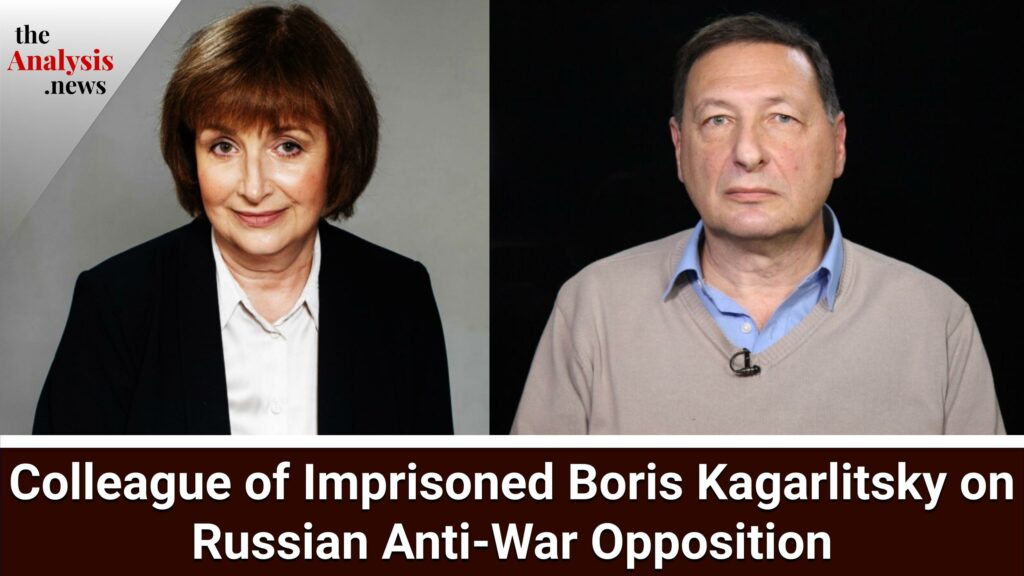
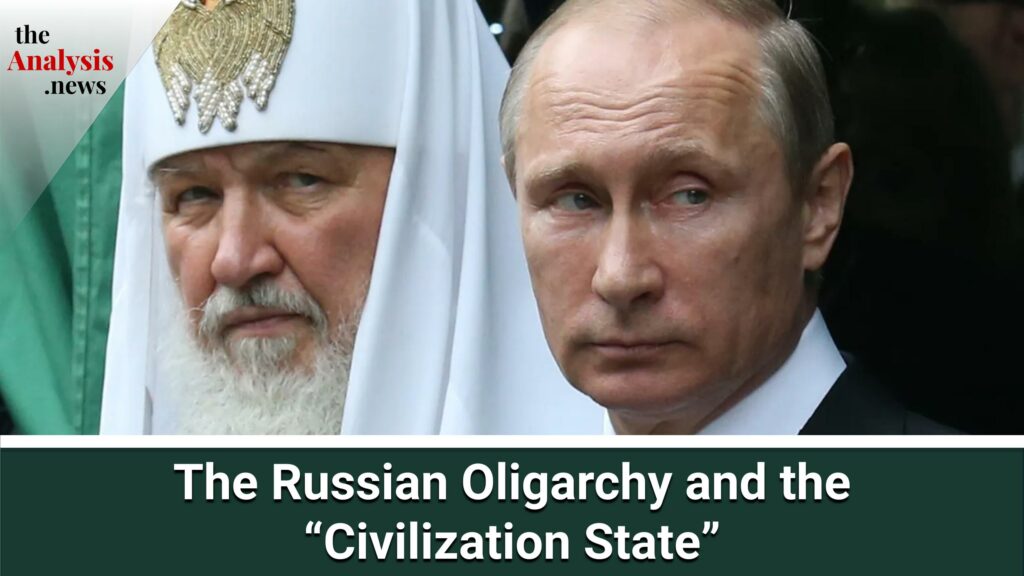
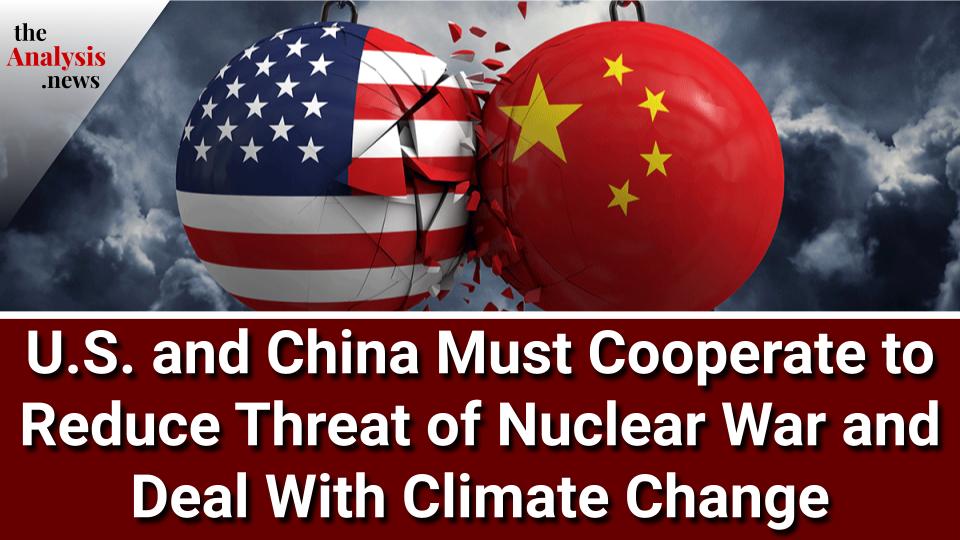
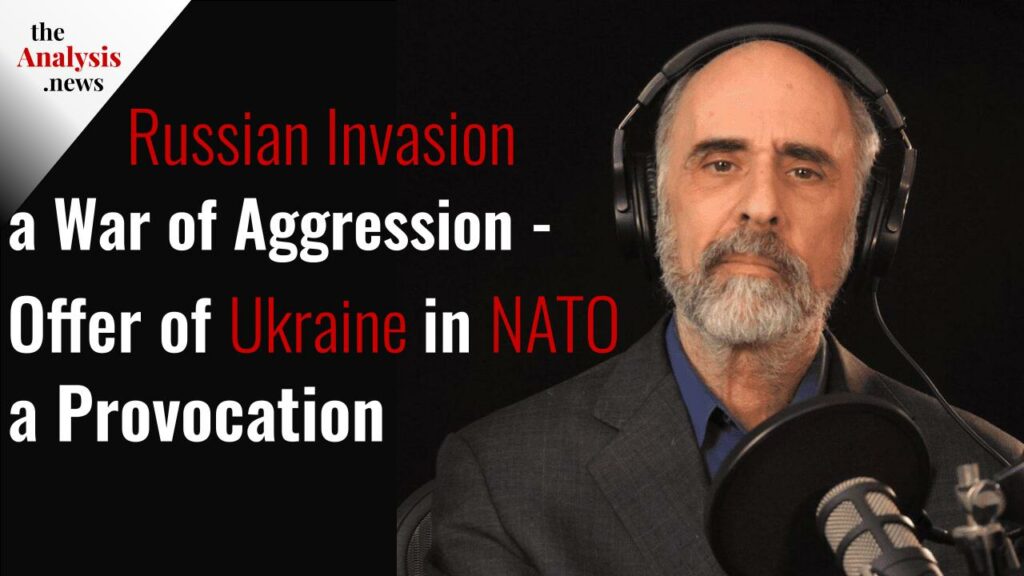
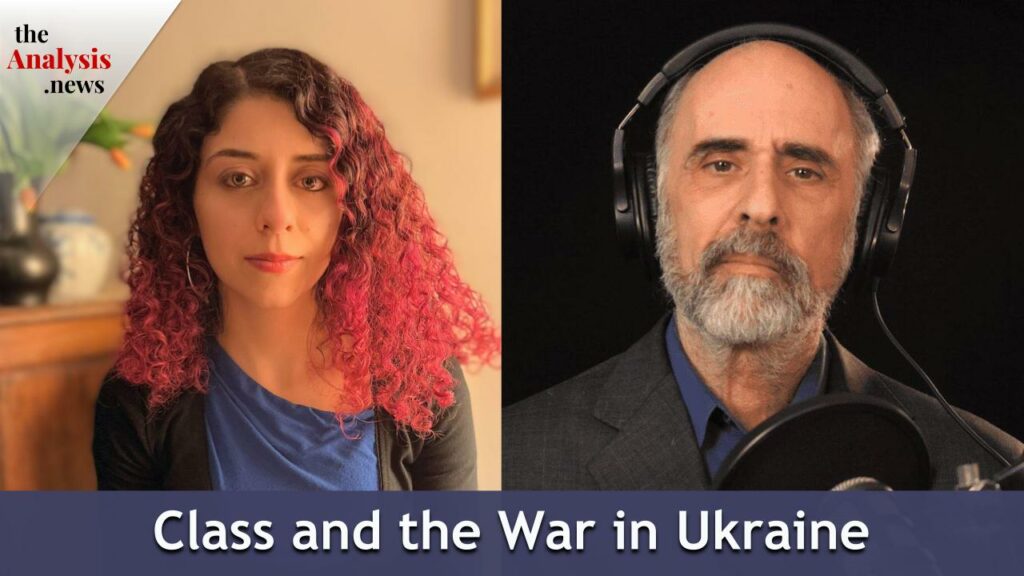
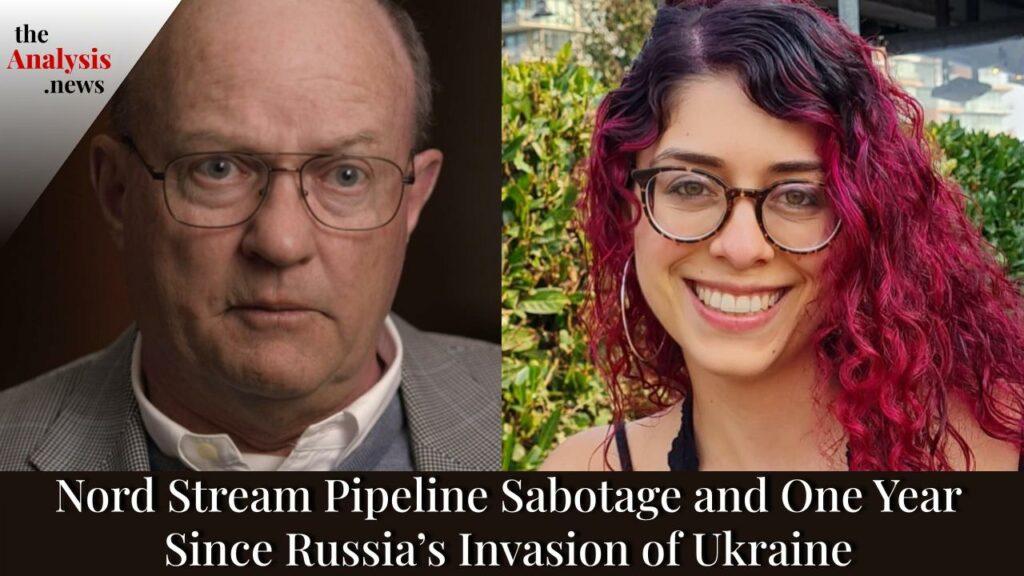
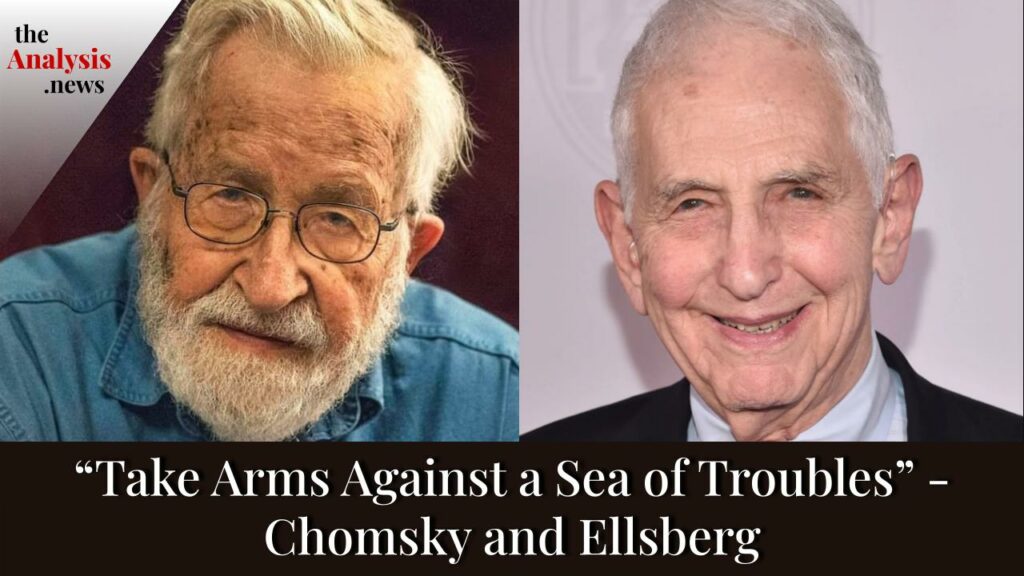
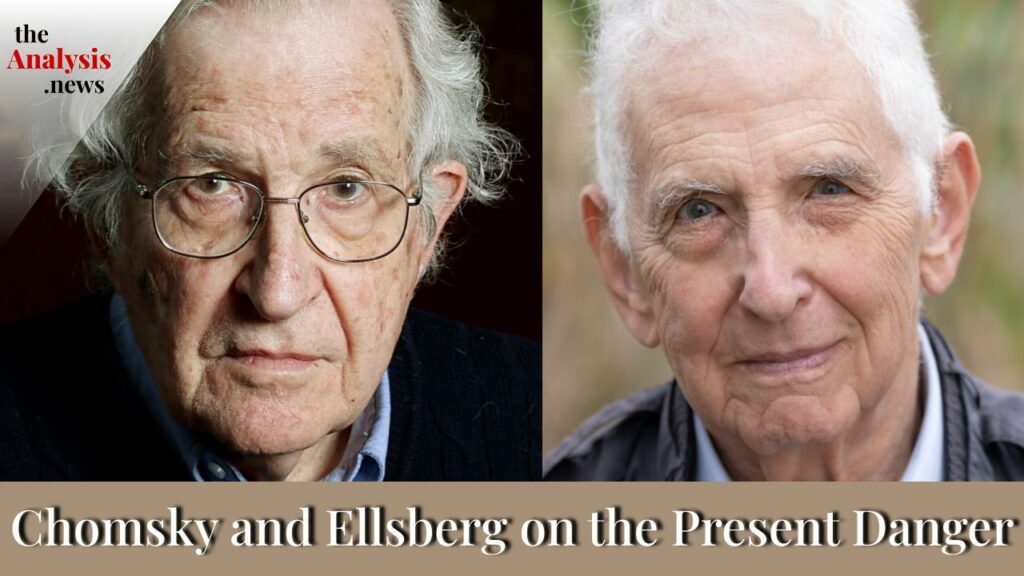
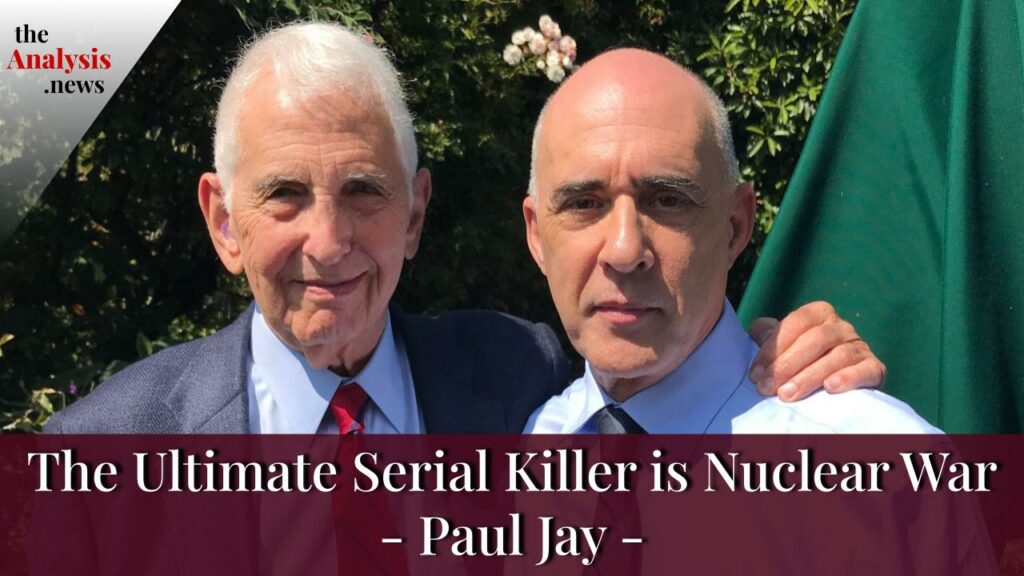



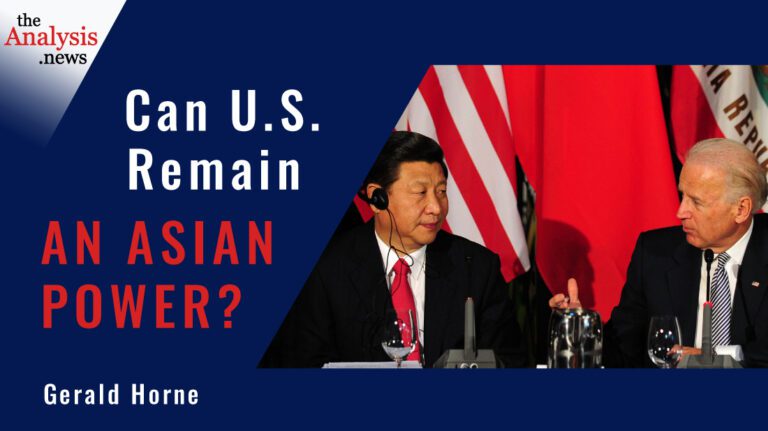

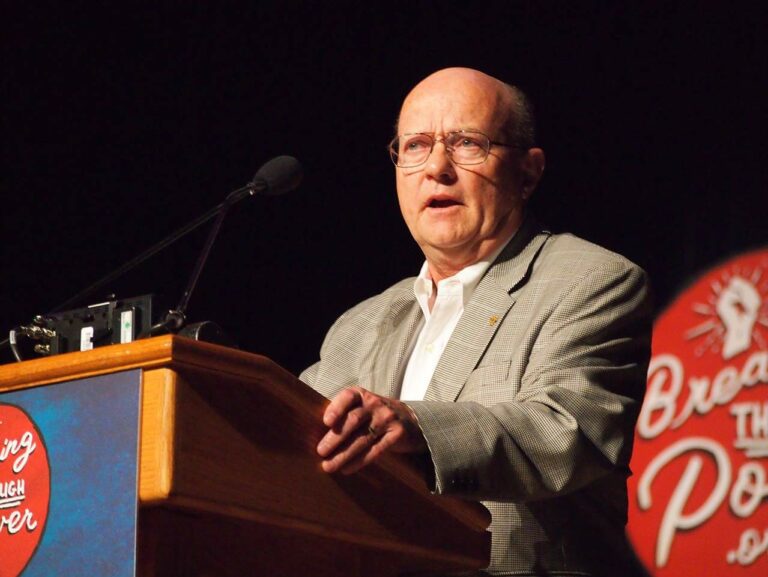
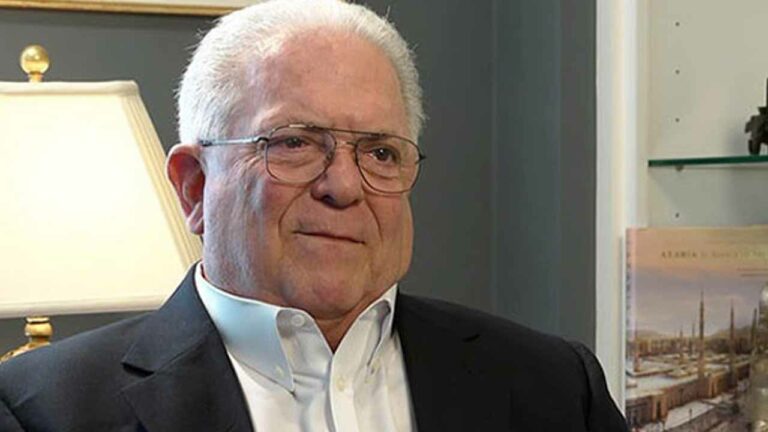
Hi Paul,
I was hoping for more of a debate or discussion in the comments when I returned, which is unfortunate, as the topics you discuss have such damning consequences.
As you outline here and in many other interviews, if climate change/chaos is allowed to develop, and we go past the warning of 1.5C onto 2C, 3C, our civilization is over barring some miracle technologies. This miracle seems unlikely given that you need a stable society to develop advanced technology, and at 1.5C+, society is already starting to destabilize from drought, famine, fires, sea rise and eventually mass migration of refugees. Freedom of speech and a healthy, educated society capable of cooperating humanely has been under attack in the US for generations, so what can we expect to happen in the US just with the next presidential election, let alone with future generations coping with climate chaos?
…
Regarding Russia:
It would be fascinating for you to have an interview with Peter Lavelle (an American expat living in Russia who hosts the RT show Crosstalk), to talk about Putin and domestic freedoms in Russia, as I’m often in agreement with his reasoning about the Ukraine war (see a recent show such as: https://odysee.com/@RT:fd/CrossTalk_22-yt:a).
Even if Putin wanted to have a healthy democracy, it would be difficult as the the CIA is ready to use NGOs and even well-meaning dissidents, to undermine a govt opposing US hegemony. Consider how the US has overthrown much smaller countries who elected popular leaders (Egypt and Nasser, Chile and Allende, (tried, failed) Chavez and Venezuela), etc).
The US loves so called “democracy” because it’s the easiest form of government for them to exert outside influence on while maintaining the appearance of legitimacy. Basically whoever has more money is guaranteed to win the election in such a system, and would you look at that, we control the printer for the world’s reserve currency. How convenient. The Chinese get to work hard to send us real tangible goods, and we get to send them paper and promises. I digress. The fact of the matter is that people as a group, the masses, are not particularly hard to manipulate. This engineering problem, you could say, has been solved for a long time now. Every country has their own systems of social control. Yes, Social control in Russia is pretty solid under Putin and can be just about as brutal as anywhere else. No doubt Putin’s got that place on lockdown, but even his wet dreams aren’t close to the kind if air-tight control the US has enjoyed for the past half century. That’s starting to unravel a bit now with, lets say, Trump and the increased civil strife, but the US is still by far the most stable state on the planet. By far. It was hilarious to listen to Blinken talk about some of these things in his recent testimony to congress. Everything the guy is saying about Russia is equally if not even more true about the US. Oh we’re trying so hard but it’s difficult to penetrate Putin’s system of social control, he’s got the media so locked down, etc. etc. I don’t understand how they say such things with a straight face. Yes it’s true, but talk about open season on hypocrisy. You’re not allowed to point out the obvious glaring hypocrisies or demonstrate that the US doesn’t have a leg to stand on or else the mechanism of “whataboutism” gets invoked, a neat trick to brush this inconvenient uncomfort away.
I would second Cynical Rex’s comments. This was a war that did not need to happen. NATO has become an offensive weapon aimed directly at Russia. No attempt has been made to look at the agreements made when the Warsaw Pact was disbanded. No attempt has been made to look at the Minsk accords. Shameful. Germany now has nukes.
Paul:
I really want to push back on your judgements about Putin, especially as you are a journalist and try to be objective and informed as possible in describing world affairs. Putin has shown himself to be highly intelligent and with a sense of history: take his speech in 2007 at the Munich Security conference warning about US hegemony or his essay on the lessons of WWII printed in the National Interest (https://nationalinterest.org/feature/vladimir-putin-real-lessons-75th-anniversary-world-war-ii-162982). It’s also dangerous to assume he did not act rationally in the conflict with Ukraine, and such statements support US propaganda efforts. There was a long lead-up to the invasion, where he hosted European leaders like Macron, and tried as far as I can tell, to de-escalate with the US, and to implement the Minsk accords. His reasons for invading Ukraine were given as some have observed, a policing action, to liberate the Donbas and de-nazify the country.
I’m not saying Putin should be congratulated for the Ukraine war, or that Russia would not gain economically through its own military-industrial complex. However, I do fault the US govt for wanting this invasion, and essentially using Ukraine as a proxy-war with Russia (and by extension China). I suspect the Russians gave up on Europe honoring the Minsk accords, and along with reports of massing Ukrainian troops in the Donbas and reports of increased shelling in the days leading up to the invasion (see: https://www.reuters.com/world/europe/russia-says-sharp-increase-shelling-donbass-is-alarming-2022-02-18/), Russia took it as an opportunity to intervene.
The US could easily have prevented this war by helping to implement the Minsk accords. Instead the State Department is a front for the arms manufacturers, and continues to spend money on military aid. Russia has sent an official diplomatic letter to the US to have it desist from sending weapons (see:https://thehill.com/policy/international/3269401-russia-sends-formal-letter-warning-us-to-stop-arming-ukraine-report/). I speculate that Russia wants a peace agreement with Ukraine (to remain neutral, outside NATO), but the influence of the nationalist battalions and the US actively prevents peace.
There have been assessments of the Russian military as competent and strategic (Scott Ritter, Col Doug Macgregor). If Russia unleashed its army and obliterated the Ukrainian forces it has cut off in the Donbas, President Zelensky and the remaining nationalist battalions would be more committed to war and less likely to entertain peace: Zelensky recently said as much (https://www.cbc.ca/news/politics/ukraine-russia-zelensky-putin-mariupol-1.6423886). However, Russia has a dilemma as long as the US funnels weapons and supplies to Ukraine, and advises Zelensky not to meet Russia’s terms, because to destroy the eastern Ukrainian army will enrage nationalist forces in Ukraine and prolongs the war indefinitely, but to watch the US continue sending weapons, advisers and supplies also prolongs the ground war. The US is risking a NATO-Russian conflict and escalation to nuclear war, all to keep the profits in the MIC flowing.